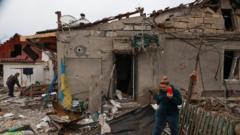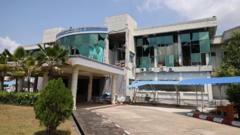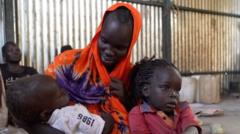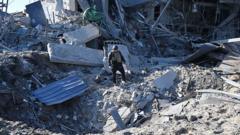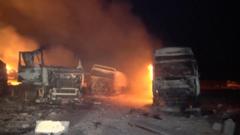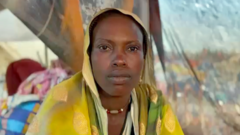During his recent visit to Chad, David Lammy expressed horror at the conditions faced by refugees escaping the civil war in Sudan, calling for increased international support and immediate action to address the humanitarian crisis.
David Lammy Visits Sudanese War Refugees: A Call for Action
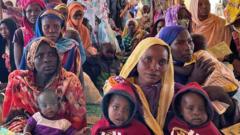
David Lammy Visits Sudanese War Refugees: A Call for Action
UK Foreign Secretary profoundly impacted by accounts of violence and desperation faced by families fleeing Sudan.
David Lammy, the UK Foreign Secretary, has voiced deep concern and horror following his recent visit to the Adré border post in Chad, where he witnessed firsthand the dire situation faced by families fleeing the ongoing conflict in Sudan. Each day, countless individuals—primarily women and children—cross a parched path into Chad, escaping the violence and famine that have ravaged their homeland.
During his visit, Lammy met refugees who shared harrowing stories of separation and loss, highlighting the brutal realities born from the civil war sparked by a fallout between the Sudanese army and the paramilitary Rapid Support Forces (RSF). “What I’ve seen here is among the most horrific things I have ever encountered,” stated Lammy. He described graphic accounts of violence, including murder, mutilation, and sexual assault, as well as extreme hunger and malnutrition conditions that many children face.
Among the refugees was Halima Abdalla, a 28-year-old mother, who expressed her relief at survival, despite having lost a child while fleeing from the violence in Darfur—a region that has seen some of the most intense brutality during the 21-month conflict. Aid organizations on the ground are making efforts to reunite families separated during their harrowing escape, often having to choose which children to take, as they run from soldiers and violence.
Throughout his visit, Lammy spoke with families fleeing and frontline aid workers, shedding light on the staggering humanitarian crisis that has left over 12 million people displaced since the conflict began. He decried what he termed a "hierarchy of conflict," arguing that the atrocity in Sudan is given insufficient attention from the international community despite it being the world’s largest humanitarian crisis at present.
During prior attempts to broker a ceasefire through the UN Security Council, Lammy's efforts faced obstacles, including a veto from Russia. He expressed frustration at the lack of urgency and support for the refugees and promised to advocate for renewed international action, planning to convene a meeting with neighboring nations and global partners to pursue peace initiatives.
Despite escalating violence, Lammy noted efforts by the UK to double its aid commitment to the region, reaching £200 million ($250 million), while urging other nations to increase their assistance. However, concerns linger regarding the impact of potential aid cuts from major donors, notably the recent freeze announced by the United States government.
UN agencies estimate that almost half of Sudan’s 50 million civilians are in dire need of humanitarian assistance, as malnutrition rates soar, particularly among children. Lammy's visit comes at a critical time, with the need for support more urgent than ever as local communities like Adré see their populations swell to over five times their original numbers due to the influx of refugees.
As families receive minimal food rations at distribution centers, the suffering continues just over the border in Darfur, where famine conditions persist. After his visit, Lammy underscored the pressing need for the global community to awaken to the scale of suffering and the imperative to act swiftly and effectively to aid those caught in this tragic conflict.

